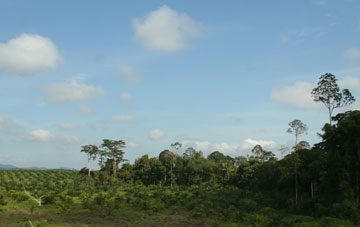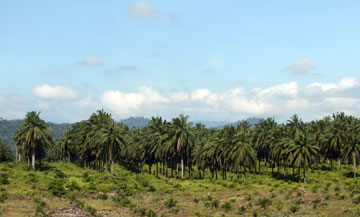Palm oil industry announces “eco” standards for production
Palm oil industry announces “eco” standards for production
mongabay.com
November 26, 2007
Palm oil producers — under fire from environmentalists who say the industry is driving the wholesale destruction of biodiverse rainforests in Malaysia and Indonesia — last week announced a new certification process to ensure greener environmental standards for palm oil, reports Reuters.
The criteria come under the auspices of the industry-led Round Table on Sustainable Palm Oil (RSPO), an initiative that seeks to produce environmentally-friendly palm oil but has been increasingly criticized by green groups for falling to meet its objectives. Earlier this month, environmental lobby group Greenpeace released a scathing report that accused RSPO members of failing to track palm oil back to the plantations where it was produced.
  Where rainforest once stood in Malaysia now stands row after row of oil palms. Photos by Rhett A. Butler. |
“The global palm oil industry is unable at present to provide anyone with evidence of traceability beyond processor, to plantation level,” stated Greenpeace’s report. “Consequently, consumer companies who manufacture products using palm oil have virtually no way of knowing whether or not the palm oil they are using is from rainforest destruction and conversion of peatlands.”
Under the new standards, palm oil producers will commit to “preserve rainforests and wildlife, avoid conflicts with indigenous people and improve palm oil yields,” according to Reuters. The criteria should be in place by the first quarter of 2008.
RSPO members hope the initiative will help quell criticism from environmentalists. The announcement comes as palm oil producers have stepped up their PR campaign, which claims that palm oil is a key part to fighting global warming and accuses green groups of trying to harm the industry’s image.
Related articles
Is the oil-palm industry using global warming to mislead the public?
(11/23/2007) Members of the Indonesian Palm Oil Commission are distributing materials that misrepresent the carbon balance of oil-palm plantations, according to accounts from people who have seen presentations by commission members. These officials are apparently arguing that oil-palm plantations store and sequester many times the amount of CO2 as natural forests, and therefore that converting forests for plantations is the best way to fight climate change. In making such claims, these Indonesian representatives evidently are ignoring data that show the opposite, putting the credibility of the oil-palm industry at risk, and undermining efforts to slow deforestation and rein in greenhouse gas emissions.
Carbon offset returns beat forest conversion for agriculture in Indonesia
(11/21/2007) Conversion of forests and peatlands for agriculture in Indonesia has generated little economic benefit while releasing substantial amounts of greenhouse gases into the atmosphere, reports a new study from the the World Agroforestry Centre (ICRAF), the Center for International Forestry Research (CIFOR) and their Indonesian partners.
Greenwashing the palm oil industry
(11/12/2007) A new report from Greenpeace alleges that members of the Roundtable on Sustainable Palm Oil — an industry-driven initiative to clean up palm oil production — are using palm oil derived by clearing endangered rainforests and draining carbon-rich peatlands on the Indonesian island of Sumatra.
Dutch: no subsidies for biofuels-driven rainforest destruction
(10/31/2007) The Dutch government will exclude palm oil from “green energy” subsidies as growing evidence suggests that palm oil is often less sustainable than advertised.
Avoided deforestation beats timber, palm oil, in tax revenue for Indonesia
(10/29/2007) Indonesia could more than double its tax revenue by protecting forests and selling the resulting carbon emission credits instead of timber and palm oil, a University of Michigan researcher told Bloomberg.
 |
Does palm oil alleviate rural poverty in Malaysia?
(10/23/2007) While it is often argued that the economic benefits of oil palm plantations outweigh the environmental costs of converting biodiverse ecosystems to monocultures, new analysis suggests that the role of plantations in reducing rural poverty may be overstated.
Environmentalists and palm oil producers should work together
(9/25/2007) Environmentalists and palm-oil producers are increasingly at odds. Greens groups say palm oil is driving the conversion of tens of thousands of hectares of peatlands and lowland forest in Indonesia, putting wildlife at risk, increasing the vulnerability of forests to fires, and triggering large emissions of greenhouse gases.